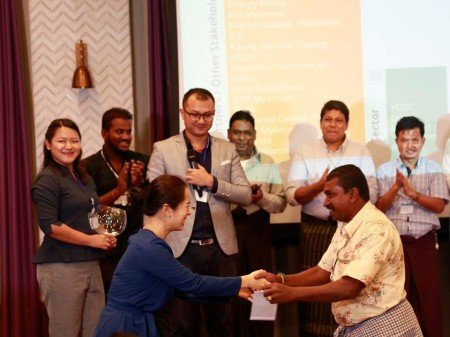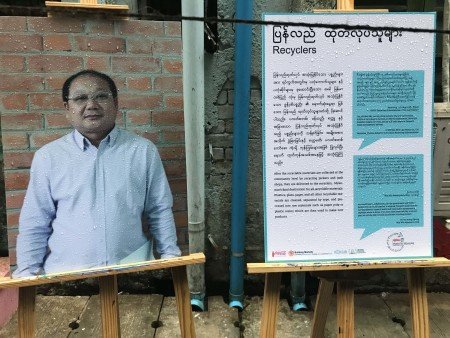Creating value from waste: An initiative to tackle Myanmar’s trash problem
Creating value from waste: An initiative to tackle Myanmar’s trash problem
June 21, 2019 | Building Markets
Myanmar has one of the fastest growing consumer markets in Asia. While this rapid development provides a huge benefit to entrepreneurs and innovators in the country, the increasing production of waste, including plastic, is threatening environmental sustainability. At the moment, the rate of recycling for materials such as plastic is among the highest in Southeast Asia, and yet, plastics continue to fill landfills and wash up in the Irrawaddy river at an alarming rate.
Previously, Myanmar’s recycling industry exported much of its recyclable plastic material to China, whose manufacturing industry repurposed the material. However, in 2018, China began producing so much plastic domestically that it no longer needed to import the raw material from outside sources, disrupting sales of exports in this industry. While well situated for growth, Myanmar’s current recycling sector is largely informal. As the economy continues to develop, new, innovative support to increase collection and repurposing of recyclable material will be crucial to ensuring sustainability. Without a change in the status quo, the Myanmar landscape is at threat of being overwhelmed by litter.
Hlaing Thar township
Building Markets is leveraging its role as an ally and supporter of small businesses in Myanmar to respond to this problem. With funding from Coca-Cola, Building Markets Myanmar is building a tailored program to reduce waste by scaling recycling businesses across the value chain and increasing public awareness about this issue. On World Environment Day 2019, the organization celebrated the launch of its latest initiative, A Mhike Ka Nay Shwe (Trash to Treasure), at a first-of-its-kind event in the country. Over 120 participants in Myanmar’s recycling and waste management sector met at the Mercure Hotel Yangon Kaba Aye to network, learn from panelists, and discuss future opportunities in this critical industry.
Panelists discussed the current status of the recycling sector and their vision for the country, including the importance of strengthening and empowering businesses in this industry. They also highlighted the importance of the government in improving the business environment, such as by addressing tax issues and implementing new infrastructure like solid waste filtering in sewers.
Panelists (several featured in photo) included:
Daw Kyi Pyar, Member of Parliament for Kyauktada Township;
U Soe Min, Managing Director, New Life Plastic Co., Ltd. and Chairman of Myanmar Plastic Industry Association Recycling Sub-Committee; U Tin Aung Khaing, Director, Win Win Myaing Co., Ltd.; Daw Wyne Pyae, Co-Founder, Thant Myanmar; U Aung Khant, Executive Director, Urbanize Policy Institute and Former Candidate for YCDC election.
Event participants were introduced to new funding opportunities, potential partnerships, and learned about Building Markets upcoming training opportunities. For the past several months, Building Markets has been interviewing stakeholders and businesses in the recycling industry throughout Yangon, Mawlamyine, and Mandalay. These interviews provided insight on the unique challenges, constraints, and innovations of these businesses, which was used to design a tailored training and mentorship program beginning this summer. Building Markets will also work to improve transparency and access to information in the recycling value chain, creating opportunity for more potential partnerships and market innovations.
In addition to supporting the growth of businesses in this sector, efforts to reduce littering and teach communities about waste disposal will be necessary to make significant change. One of the most significant ways to improve the recycling and repurposing of material is by increasing the rate of separation (into plastics, waste, paper, etc) at the household level. Once recyclable material makes its way to a landfill, it is much less likely to ever be recycled. Building Markets has partnered with Doh Eain, a community organization in Yangon, to innovate solutions to encourage waste separation.
Doh Eain Community Event (June 2019)
Business owners reported that this event gave them the opportunity to voice their concerns in front of stakeholders for the first time. In addition to training and mentorship, networking and information sharing are crucial for building this industry. As Building Markets continues to support recycling efforts in Myanmar, it will focus on bringing communities, businesses, and stakeholders together to confront the issue of sustainability in Myanmar as a comprehensive, shared effort.
For more information about Building Markets Myanmar, please email myanmar@buildingmarkets.org




